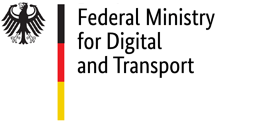Latest news
For merchant ships flying the German flag, some new requirements for medical equipment on board have entered into force.
Aside from an equipment indexes, the new "State of medical knowledge" includes practical advice regarding storage of drugs and medical products on board. Shipowners have to apply the changes with the next annual survey of the medical equipment.
More information on the topic is given under "Maritime Medicine". A summary of the changes vis-à-vis the previous "State of medical knowledge" is provided in an information leaflet (only available in Geman).
The "Bundestag" adopted the abolishment of the seafarers' average wages from 1 January 2027. This means that in the future, social security contributions for seafarers will be calculated in the same way as for people working ashore. The German Flag becomes easier and less bureaucratic.
Up until now, social security contributions for seafarers on German-flagged sea-going vessels have not been calculated based on the actual income but according to the "average wages". These average wages are average figures for seafarers' salaries that are defined by a committee of the German Social Accident Insurance Institution for Commercial Transport, Postal Logistics and Telecommunication (BG Verkehr), on the basis of employment agreements for German maritime shipping.
On 6 November 2025 the "Bundestag" adopted amendments to the "Sozialgesetzbuch" (Code of Social Law) VI in its third reading of the act, which contains the abolishment of the average wage scheme for seafarers in Article 9 Paragraph 4. This part of the act comes into force on 1 January 2027. It accommodates the wish of the shipping companies to provide sufficient transition time to modify the payroll.
The act regulates the adjustment of the notification and contribution procedure for seafarers from average wage to actual salary. As of 2027, the same calculation and payment of social security contributions applies for seafarers as for other economic branches. The transition applies to all social security branches of the statutory social security.
The abolishment of the special arrangement for seafarers offers shipping companies the option to use the same standard accounting software as for their land-based employees. The German Flag becomes easier and less bureaucratic.
According to the explanatory memorandum for the act, this simplification will not lead to any disadvantages for seafarers:
"The abolishment of the special average wage procedure for employed seafarers means that seafarers will be treated the same way as other commercial employees regarding contributions, without this leading to shifts in contributions in the form of contribution shortfalls or in the associated benefits for seafarers. The salary for seafarers already consists of basic wages, bonuses for shifts on Sunday, public holidays and during night, other benefits in kind, a flat-rate overtime allowance and the basic wage supplement entitlement. All these types of renumeration are to be included in the current or one-off remuneration pursuant to Section 14 of Book IV of the "Sozialgesetzbuch", so that the special provision for determining the average wage tables is no longer justifiable." (explanatory memorandum for Article 9 No.4 = page 76)
The act was announced in the Federal Law Gazette on 23 December 2025; the legislative procedure has therefore concluded.
The abolishment of the average wages should have already been adopted by the "Bundestag" the year prior. However, the respective legislative procedure could not be concluded due to the breakdown of the governing coalition, which led to a shortened legislative period.
Out now: Annual Report 2025 of the Ship Safety Division on the implementation of the Maritime Labour Act
Paris MoU Advisory Board at the Ship Safety Division of BG Verkehr
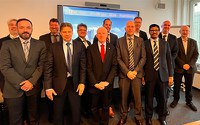 On January 27 and 28, 2026, the Paris MoU Advisory Board (MAB) held its 163rd meeting in Hamburg.
On January 27 and 28, 2026, the Paris MoU Advisory Board (MAB) held its 163rd meeting in Hamburg.
The Head of the German Port State Control Department, Mike Meklenburg, welcomed representatives from the Federal Ministry of Transport, the Paris MoU Secretariat, the European Commission, EMSA, as well as delegations from Ireland, Canada, France, and the United Kingdom to the premises of the Ship Safety Division of BG Verkehr.
The MAB advises the Port State Control Committee (PSCC) on policy matters, provides guidance to the Paris MoU task forces, and supports the work of the Paris MoU Secretariat. MAB members are senior officials or their deputies responsible for Port State Control policy matters.
The MAB meets several times a year, with at least one meeting held in person.
Discussions focused on preparations for the 59th session of the Paris MoU Port State Control Committee which will take place from May 18 to May 22, 2026, in Glasgow.
Liability Certificates: New term is starting – apply now
For many ships, the new insurance year is starting.
Remember to apply for necessary liability certificates for the new term.
You are welcome to send applications, authorizations, if applicable, the Blue Cards and other documents to nwrc@bsh.de already.
Further information and application/authorization forms are available in our section on "Liability".
New PSC Awareness newsletter 03/2025 available
ISM Circular 03/2025: STCW Code Amendments regarding basic safety training
Safety Bulletin 02-2025: Containers - cargo handling and securing
Operands and contributions for social security in 2026
Line thrower JH7-230-91 NINGBO ZHENHUA
The Norwegian Maritime Authority has issued a safety notice regarding an accident involving a line throwing appliance of type JH7-230-91, produced by NINGBO ZHENHUA, in which a person was seriously injured. The device lacked sufficient external labeling with clear safety instructions. This deficiency also affects other devices of the same type.
For your own safety, please take note of the information provided by the Norwegian Authority and check whether you have any JH7-230-91 NINGBO ZHENHUA line-throwing appliances on board.
New ISM Circular 02/2025 on Lifting Appliances
German Flag recertified to ISO Standard
The Ship Safety Division of BG Verkehr and the Federal Maritime and Hydrographic Agency (BSH) have been recertified in accordance with DIN EN ISO 9001:2015. With these certificates, the certification bodies have attested to the BSH and the Ship Safety Division that they each meet high quality standards and work to the satisfaction of their customers.
The Ship Safety Division and the BSH have voluntarily had their quality management system audited externally for a long time. The DIN EN ISO 9001 standard places certain requirements on the quality of work. In an audit, the BSH and the Ship Safety Division proved that they are on the right track in terms of quality and customer satisfaction, among other things.
- Certification of the Ship Safety Division in accordance with DIN EN ISO 9001:2015 by Zertpunkt GmbH:
- Certification of the Federal Maritime and Hydrographic Agency in accordance with DIN EN ISO 9001:2015 by RINA Services S.p.A:
Find out what else speaks for shipping under the German flag!
This year, the shipping world celebrates the World Maritime Day on 25 September. The International Maritime Organization (IMO) has declared this year's motto to be: Our Ocean, Our Obligation, Our Opportunity.
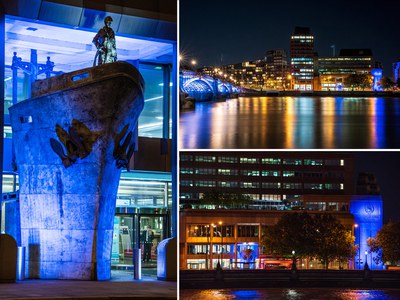 This year's motto of the World Maritime Day highlights the importance of the oceans - after all, around 80 percent of the world's trade is shipped over the seas. That is another reason why it is important to protect the oceans and use their ressources sustainably. International Maritime Organization (IMO) contributes to this goal: Its globally applicable instruments enhance the safety of maritime shipping and provide protection of the marine environment.
This year's motto of the World Maritime Day highlights the importance of the oceans - after all, around 80 percent of the world's trade is shipped over the seas. That is another reason why it is important to protect the oceans and use their ressources sustainably. International Maritime Organization (IMO) contributes to this goal: Its globally applicable instruments enhance the safety of maritime shipping and provide protection of the marine environment.
On 25 September, the IMO headquarters in London are lit up in blue and, on its social media channels X (former Twitter), Instagram, Facebook and LinkedIN, the IMO and its followers celebrate maritime shipping under the hashtag #WorldMaritimeDay. The UN specialized agency calls on its member states to illuminate their buildings in blue as well or celebrate the World Maritime Day with other campaigns. Germany will hoist the flags at its official buildings in North Germany on the day; for this a special flag order has been issued.
On the IMO website, the Secretary General of the IMO, Arsenio Dominguez, directs a special greeting to the maritime world. In it, he draws our attention to the this year's theme of the World Maritime Day "Our Ocean, Our Obligation, Our Opportunity", which is closely linked with the Sustainable Development Goals of the United Nations. The oceans are essential in many different ways for us humans - as well as for marine animals. Moreover, they regulate the climate of the earth. Because the protection of the oceans concerns us all - big or small - the Secretary General visited a school in England this year where he was interviewed by the some of the pupils about marine environment protection.
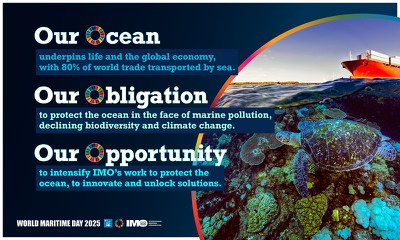
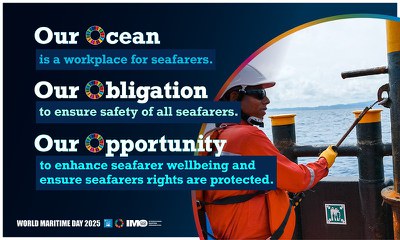
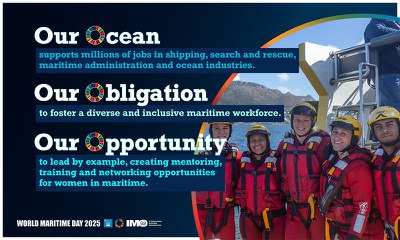
New issue of newsletter: PSC Awareness 02/2025
To Newsletter PSC Awareness 02/2025
Repeatedly, shipping companies reported of difficulties with ballast water management systems (BWMS) due to sediments in North Sea ports. Now the OSPAR Commission has established a new Intra North Sea Area for ballast water contingency measures.
Most ballast water management systems (BWMS) on board sea-going vessels have filtration as first stage of treatment followed by at least one more treatment stage. This way, the systems ensure no foreign organisms enter the ecosystem with the ballast water.
Practical experience has shown that some BWMS – depending on the type and installation setting on board – do not operate properly or at all in ports with high sediment load (tidal sands or silt deposition). In these cases, might only be possible to collect the ballast water via a bypass. Afterwards, the contaminated tanks and piping have to be decontaminated to comply with the mandatory ballast water standard D-2.
New Intra North Sea Area
Against this backdrop, the OSPAR Commission established an Intra North Sea Area Ballast Water Contingency and Compliance Area where the necessary decontamination procedure can be conducted in accordance with all requirements. The information "Intra North Sea Ballast Water Contingency and Compliance Area in accordance with BWM.2/Circ.62 and MEPC.387(81)" by the OSPAR Commission contains the geographic coordinates of the contingency measure area and the conditions under which a decontamination procedure is permitted there. In a few individual cases, after approval by the BSH, a ballast water exchange is also permitted.
This facilitation decided by the OSPAR Commission only applies to intra North Sea traffic and only under the conditions given in paragraphs 2 to 9 of the agreement "Intra North Sea Ballast Water Contingency and Compliance Area in accordance with BWM.2/Circ.62 and MEPC.387(81)" of the OSPAR Commission.
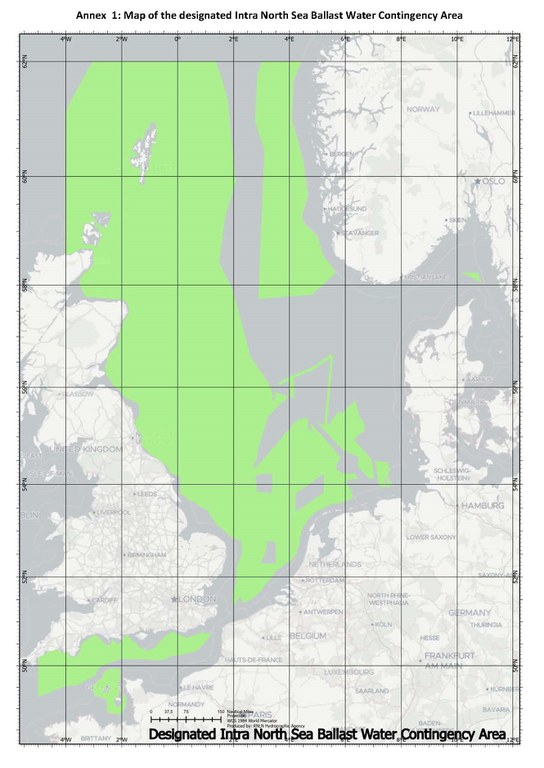
Practical tips
In case ballast water is intended to be taken up in a German North Sea port and problems occur or are expected to occur with the BWMS, we recommend to the ship management to contact as early as possible
- the responsible port authority and
- the Federal Maritime and Hydrographic Agency (BSH)
to coordinate the following course of action and, if appropriate, receive an approval to use the contingency measure area.
The current information Contingency measures for BWMS when encountering challenging water quality during uptake by the BSH contains tips for shipping companies and ship management which measures may be taken after agreement of the ports and the BSH when encountering problems with ballast water management systems in ports with high sediment pollution.
Cyber-attacks are a large threat for safe and smooth shipping. Aside from the dangers it poses to the ship, its crew and the environment, the financial damage is oftentimes also significant. The comprehensively revised IMO guidelines provide shipping companies and crews with assistance to harden the ships defences against computer attacks aimed at their digital infrastructure with an effective cyber risk management.
Effective cyber security depends, for one, on the ship's type, trading area and how digital it is as well as the interfaces leading outside. But there are also some fundamental aspects that should be observed – and this is where the IMO guidelines come in and provide valuable advice about how the issue of cyber security on board a ship can be approached and what should be considered in any case. Don't forget: The individual cyber risk management on board has to be specified in the ship's safety management system (SMS).
The IMO has revised their guidelines and published them as circular MSC-FAL.1/Circ.3/Rev.3. The guidelines now define key terms for this increasingly important security issue and focus on which systems need to be considered: from integrated bridge systems over cargo handling and general security systems to administration and crew management software.
For an effective protection against cyber-attacks of any kind, the guidelines identify 6 functional elements that should be part of the cyber risk management of any ship:
- Clearly define who is responsible for the cyber risk management both in the shipping company and on board,
- Identify all digital systems – especially those that could be particularly vulnerable to cyber-attacks,
- Advice about the available options of cyber protection: from password and firewall to incidence response plans,
- Detection of attacks,
- Short- and long-term response and reaction to an attack,
- Transition back to normal operation after an attack.
functional elements. Only if ship management and crew are aware of the threats posed by a cyber-attack and what impact it would have, they will take the necessary (personal) cyber hygiene seriously and, thereby, be able to ward off attacks successfully as well as react correctly in case of an emergency.
The IMO guidelines also contain tips on further references on the topic, which have now been supplemented with requirements (procedures and technical standards) of the International Association of Classification Societies (IACS).
We as German Flag offer additional support for you with our Guidance "Ism Cyber Security" developed together with the Federal Office for Information Security (BSI) that contains practical tips on planning cyber risk management in the safety management system (SMS) in accordance with MSC.428(98).
More information about the topic can be found in the ISM Circulars 04/2017 and 01/2020 as well as here on this website under Cyber Risk Management.
Use or storage of extinguishing media containing PFOS
With the latest SOLAS amendments, the IMO prohibits the use or storage of extinguishing media containing perfluorooctane sulfonic acid (PFOS).
The IMO amended the regulations II-2/1 and II-2/10 SOLAS in order to protect the crew against exposure to this dangerous substance used in fire-fighting systems as well as to minimize the impact on the environment. This primarily affects fire-extinguishing foams in stationary and mobile systems and in portable fire extinguishers.
Fire-extinguishing media containing perfluorooctane sulfonic acid (PFOS) shall be removed from the ship and delivered to appropriate shore-based reception facilities.
These changes apply to ships constructed on or after 1 January 2026. All ships constructed before 1 January 2026 shall comply to this requirement not later than the date of the first survey on or after 1 January 2026.
At the same time, there are changes to the 1994/2000 High-Speed Craft Code (HSC), Chapter 7.
With the attached circular MSC.1/Circ.1694 of 4 July 2025, the IMO provides unified interpretations (UI) and thus gives guidance on compliance matters.
Newly built ships may only be equipped with a certified, PFOS-free extinguishing medium. For the extinguishing media used on existing ships, proof that the extinguishing medium is free of PFOS must be provided, for example an approval certificate or a laboratory test – otherwise the extinguishing medium needs to be replaced. In order to avoid PFOS contamination, please note that stationary systems may need to be cleaned when replacing the extinguishing agent.
If you need to dispose of media containing PFOS, please ensure that you obtain suitable documentation and keep complete records, including entries in the ship's logbook. You may need this to prove that you have complied with the disposal requirements.
Additional information:
- Reference IMO resolutions. MSC.532(107) - SOLAS, MSC.536(107) - 1994 HSC Code, MSC.537(107) - 2000 HSC Code.
- First survey: the annual, periodical or renewal survey, whichever is due first (e.g. cargo ship safety equipment certificate, cargo ship safety certificate, passenger ship safety
certificate, or high-speed craft safety certificate). - New or replacement extinguishing media shall be marked as PFOS free. The extinguishing media shall be approved and certified in accordance with the Implementing Regulation of the EU Marine Equipment Directive (MED). These include the FSS Code (IMO resolution MSC.98(73)) and IMO circulars MSC/Circ.670 and MSC.1/Circ.1312.
From now on, uniform global minimum standards apply for ship recycling. This is good for people and for the environment – and it is also good news for shipping companies with ships under German Flag: Because for EU flag states, the higher standards of the EU Ship Recycling Regulation are already well-established.
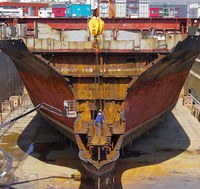 In international maritime shipping, the topic of ship recycling has so far not been a glorious one: Even up until this year, about 90 percent of the global decommissioned ocean-going ships were broken up in south Asia, most of the time on unsecured beaches and under questionable conditions.
In international maritime shipping, the topic of ship recycling has so far not been a glorious one: Even up until this year, about 90 percent of the global decommissioned ocean-going ships were broken up in south Asia, most of the time on unsecured beaches and under questionable conditions.
In Europe, the EU Ship Recycling Regulation has been in force since 2019 – and it remains the applicable instrument: Ships flying a flag of an EU member state may only be dismantled under strict conditions. This includes an Inventory of hazardous materials and commissioning listed recycling facilities only. So far, the European Commission has recognized over 40 recycling facilities where ships registered in the EU may be dismantled – among which are eight shipyards in Turkey and one in the USA.
Regrettably, so far, ships flying a flag of an EU member state make up only a small part of the globally recycled tonnage. And in the past, even of these ships not everyone was dismantled in an EU-certified recycling facility: While it was not prohibited, some decrepit ships changed to a non-EU flag at the end of their lifetime. This wa,y requirements could be avoided and costs saved.
This option no longer exists. Globally, environmental and safety requirements are a lot more stringent now that the Hongkong Convention is in force. Certified recycling facilities, environmentally sound processes, strict audits, detailed obligations of compliance and documentation as well as a well-trained and protected workforce are now mandatory all over the world. As a result, costs are rising significantly even in countries where ship breaking was previously low-priced.
This way, the Hongkong Convention equalizes previous competitive disadvantages – both European recycling facilities and shipping companies that value socially and environmentally sustainable ship recycling benefit from this. One of these shipping companies is Hapaq Lloyd: It regularly changes ships to the German Flag at the end of their lifecycle in order for the ships to be dismantled and utilized to the highest sustainability standards. Why Hapaq Lloyd goes that extra mile and which individual steps are part of their ship recycling process is explained in the company's magazine "Logbook". Read about how the Germany Flag supports other shipping companies on their way to more environmental and climate protection in our magazine "Ausguck".
More on "Ship Recycling".

